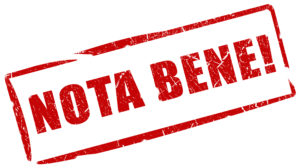Nota Bene: Promissory Notes Can Be Securities
As we’ve discussed before, N.C. Gen. Stat. § 75-1.1 does not apply to securities transactions. Courts have held that disputes involving securities transactions are not “in or affecting commerce” under the statute.
The securities exemption was born in Skinner v. E.F. Hutton & Co. In HAJMM Co. v. House of Raeford Farms, Inc., the Supreme Court of North Carolina extended the exemption’s reach to include capital-raising devices beyond traditional securities.
Today’s post discusses a recent decision in which the North Carolina Court of Appeals held that the securities exemption barred a section 75-1.1 claim concerning a promissory note.
In Nobel v. Foxmoor Group, LLC, Loretta Nobel alleged that Foxmoor Group failed to repay her for money that she had loaned to the company.
Foxmoor was a trucking company owned by Mark Griffis and Dave Robertson. Griffis and Robertson approached Nobel, a friend and business acquaintance, about investing in Foxmoor. They didn’t tell Nobel that Foxmoor was barely getting by; instead, they told her that business was “booming,” and pitched their request as an opportunity to invest in a thriving company.
After making an initial investment of $25,000, Nobel loaned Foxmoor an additional $75,000 in exchange for a written promissory note.
When it came time for Foxmoor to repay the note, things went south. Griffis and Robertson threatened that if Nobel pursued repayment, Foxmoor would declare bankruptcy. To ensure that Foxmoor could not satisfy its obligation to repay the note, Griffis and Robertson drained all of Foxmoor’s money for their personal use.
Nobel sued Foxmoor, Griffis, and Robertson on multiple theories, including an alleged violation of section 75-1.1 based on the defendants’ inducing her to loan money to Foxmoor. Following a bench trial, the trial court found that Griffis and Robertson had acted as the alter egos of Foxmoor and concluded that all three defendants’ conduct violated section 75-1.1.
Dissecting a Promise to Pay
In a split decision, the Court of Appeals reversed the trial court’s ruling on the section 75-1.1 claim as to Robertson (the only defendant who timely appealed). According to the court, the promissory note was a capital-raising device that is exempted from section 75-1.1 liability.
Relying on HAJMM, the Court of Appeals explained that soliciting funds to build up capital is not a business activity. The HAJMM court interpreted section 75-1.1 to apply only to business activity that a company was organized to conduct. Raising capital is better characterized as a means by which a company can conduct a business activity.
The Court of Appeals explained that the conduct underlying Nobel’s section 75-1.1 claim was based entirely on the defendants’ attempts to raise funds for Foxmoor’s business operations. The court described this scenario as “almost directly equivalent to the sale of fund certificates by the defendant in HAJMM.” Like the fund certificates in HAJMM, Nobel’s promissory note was a capital-raising device, excluded from section 75-1.1’s reach under the securities exemption.
Not So Fast
The court’s holding on the section 75-1.1 claim drew a dissent from Judge John Arrowood.
Judge Arrowood noted a “significant distinction” between Nobel and HAJMM: “HAJMM involved corporate securities, while the present case notably does not.” Judge Arrowood emphasized that, because of that distinction, the same reasoning could not apply in Nobel. Instead, in Judge Arrowood’s view, Nobel involved nothing more than the nonpayment of a promissory note, with a touch of misappropriated funds in the background of the dispute. In other words, the dispute more closely resembled a breach of contract without substantial aggravating factors than a securities transaction.
An External Dispute
Judge Arrowood also addressed another 75-1.1 exemption that appeared in the parties’ briefs, but was not squarely addressed by the majority’s opinion: the exemption for internal business disputes based on White v. Thompson. That exemption excludes internal disputes among members of a business from the scope of section 75-1.1.
In his brief, Robertson argued that he “acted within the scope of Foxmoor Group” when he induced Nobel to invest money in the company. That argument missed the mark—and perhaps explains why the majority didn’t address it. As Judge Arrowood noted, Nobel had no ownership interest in Foxmoor. Because Nobel was not an owner in Foxmoor, this was not an internal dispute. To be sure, the section 75-1.1 claim targeted Robertson’s conduct toward Nobel, not his fiduciary-duty breaches to Foxmoor.
Takeaways
Nobel is an interesting data point on the boundaries of section 75-1.1’s securities exemption. The majority’s opinion focused on the underlying purpose of the promissory note between Nobel and Foxmoor: to raise capital for Foxmoor. Because the promissory note here was a capital-raising device, the question whether promissory notes issued for other purposes are “securities” did not matter. (It’s worth mentioning, though, that the North Carolina Securities Act defines “Security” to include any “note.”)
But Judge Arrowood’s dissent also raises an important question about the scope of “business activities” that are “in or affecting commerce.” In Judge Arrowood’s view, the majority’s opinion fails to distinguish notes used to raise capital from notes used for other purposes. For example, say that a business gives a note to a supplier in exchange for raw materials. That transaction would seem to fall squarely within section 75-1.1’s reach—at least for the “in or affecting commerce” element.
Last week, Nobel filed a notice of appeal in the Supreme Court of North Carolina based on Judge Arrowood’s dissent. We’ll look forward to the Supreme Court weighing in on these issues.
For now, Nobel reminds us that the securities exemption—like the North Carolina Securities Act’s definition of “Security”—extends well beyond equity interests like stock.
Author: Scottie Lee



